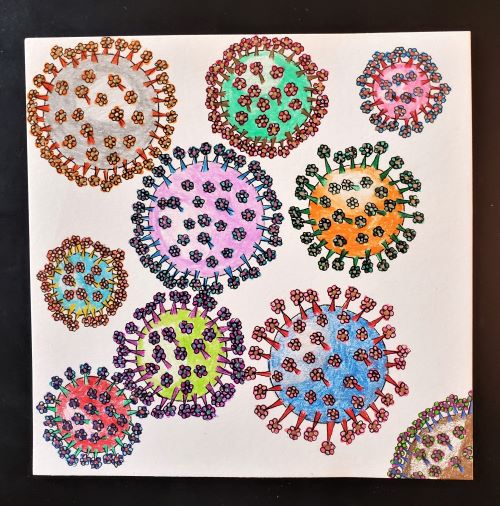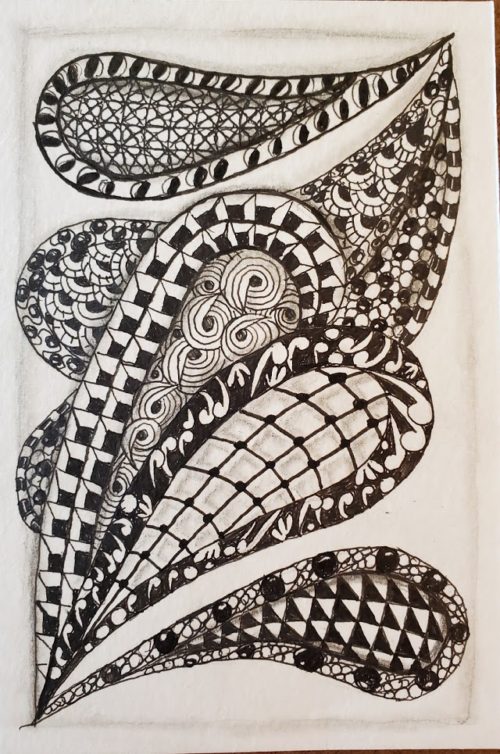The 2020 appearance of Covid-19, a novel Corona virus, has infectious disease experts recommending ways to try to contain the spread of this highly communicable disease. I propose adopting namaste as an appropriate greeting and farewell. Covid -19 is...
The 2020 appearance of Covid-19, a novel Corona virus, has infectious disease experts recommending ways to try to contain the spread of this highly communicable disease. I propose adopting namaste as an appropriate greeting and farewell.
Covid -19 is an airborne spread pathogen. When we sneeze, cough or even talk, tiny droplets are released into the air. They can then settle onto people, and even inanimate objects, waiting for an unsuspecting person to grasp a contaminated door handle, keyboard, writing implement, etc. When that person then touches their face (which apparently we all do, all.the.time), it’s possible to unwittingly infect oneself. A possible silver lining flowing from the pandemic could be fewer people stealing walking out with other people’s pens (of which I’m guilty as sin), and food from the office refrigerator (I swear it wasn’t me ).

A medical artist’s rendition of the Covid 19 Corona Virus. So pretty to be causing so much civic pain. (Photo credit: CDC Public Domain).
 Public health officials have suggested ways to slow the spread of the disease. We have been instructed to do frequent hand washing with soap and water for 20 seconds. Counting one-Mississippi, two-Mississippi, etc. all the way to 20-Mississippi can be tedious, so public health officials have suggested singing a 20 second song. A Google search reveals a range of appropriate ditties, some written specifically about germs,. However, if you’re not inclined to want to learn a new hand washing song, apparently, the Center for Disease Control (CDC) instructs you can sing Happy Birthday to You two times. Personally, I’d feel more comfortable if they provided a metronome setting, but in the absence thereof, I’m going with a moderato tempo, rather than lento or allegro. Hopefully, when you are standing there at a public restroom sink, washing your hands while belting out Happy Birthday to You — twice, you won’t be embarrassed when someone pops out of a toilet stall. I’m not sure if it’s less embarrassing if one sings Happy Birthday to two different people (i.e. dear So-and-So, and dear “what’s his name”) or if “dear Rover” twice is more appropriate.
Public health officials have suggested ways to slow the spread of the disease. We have been instructed to do frequent hand washing with soap and water for 20 seconds. Counting one-Mississippi, two-Mississippi, etc. all the way to 20-Mississippi can be tedious, so public health officials have suggested singing a 20 second song. A Google search reveals a range of appropriate ditties, some written specifically about germs,. However, if you’re not inclined to want to learn a new hand washing song, apparently, the Center for Disease Control (CDC) instructs you can sing Happy Birthday to You two times. Personally, I’d feel more comfortable if they provided a metronome setting, but in the absence thereof, I’m going with a moderato tempo, rather than lento or allegro. Hopefully, when you are standing there at a public restroom sink, washing your hands while belting out Happy Birthday to You — twice, you won’t be embarrassed when someone pops out of a toilet stall. I’m not sure if it’s less embarrassing if one sings Happy Birthday to two different people (i.e. dear So-and-So, and dear “what’s his name”) or if “dear Rover” twice is more appropriate.
When I was growing up, my father carried a handkerchief (gah). By the time our sons were in elementary school, we were invited to donate boxes of tissues for their classrooms. They were also taught that it’s good manners to sneeze or cough into their elbows, rather than to spray offensive droplets into the common air. Hopefully, they learned that lesson well since it is now an official CDC (Centers for Disease Control) guideline for preventing slowing the spread of Covid-19.
Finally, we are being urged to unlearn the Western convention of handshaking as a polite form of greeting and farewell. (If you’re from a European culture where a kiss on each cheek is de rigueur, you have more to unlearn.) Many of us can recall being taught a proper handshaking grip — not too hard, not too soft. We were going for “just right”, while looking one’s co-handshaker in the eye so as not to come off as lacking in self esteem a shrinking violet. (When I was a baby lawyer, a large opposing counsel who looked like the KFC colonel, once actually growled at me as he stuck out his hand. I gave him a Jedi grip handshake while staring into his eyes like a laser beam. (Um, no I didn’t, but to this day, some 40 years later, I wish I had.)
Greeting Techniques in Lieu of Handshaking to
Combat the Spread of the Covid-19 Corona Virus
It turns out that despite our being drilled in the proper germ destroying hand washing protocol, we are to avoid shaking hands at all costs. Various techniques have been recommended to replace handshakes. One technique favored by politicians who want to lead by example is an elbow bump. Personally, this seems like a bad an odd idea if everyone has also been walking around sneezing and coughing into their elbows.
An alternative greeting is the toe tap where each participant extends the toe of their right footwear to tap the right footwear of the other person. This makes it difficult to maintain eye contact since there is an involuntary reflex to look down when extending one’s foot to meet another’s foot. This technique could also be painful awkward if one toe tapper is wearing steel tipped work boots and the other is wearing, say, flip flops (a/k/a thongs in Australia, and jandals in New Zealand). I suspect Donald Trump could reverse the stock market dive caused by Clovid-19 by pointing out that the toe tap greeting will result in more robust sales of shoe polish.
Some Trekkies (Star Trek afficionados) like Mr. Excitement are pulling for the Vulcan salute to become the acceptable replacement for the handshake. I see several problems with this. Some people have been living under a rock have never heard of the planet Vulcan even though it’s sufficiently embedded in popular culture to have a Wikipedia entry. Others have a hard time getting their fingers into the double V position. There is actually a physiological explanation for this difficulty that I shall spare you.
My suggestion is the namaste greeting, hands and fingers pressed together in a praying formation with elbows out, thumbs touching the heart space, and a slight bow of the head and shoulders. The namaste greeting is widely practiced in India. It is also used when parting. Although namaste is of Hindu origen, many people in southeast Asian countries such as Thailand also use it even though in those countries the dominant religion is Buddhism.
In some cultures, touching other people in greeting is considered way too forward. Since, as is described above, I’ve never quite perfected my handshake technique, I was relieved to find an alternate socially acceptable greeting that doesn’t involve a handshake or more uncomfortable still, a kiss on both cheeks (quelle horreur!). In Sanskrit (the Latin of Hinduism) namaste means “I bow to you” and is intended as a sign of respect. I’ll not go down the rabbit hole of opining whether using a namaste greeting will consign an individual to H-ll. (You can google that yourself). I’m quite sure the CDC doesn’t want you to go there.
What is your choice to replace a germ filled handshake?














